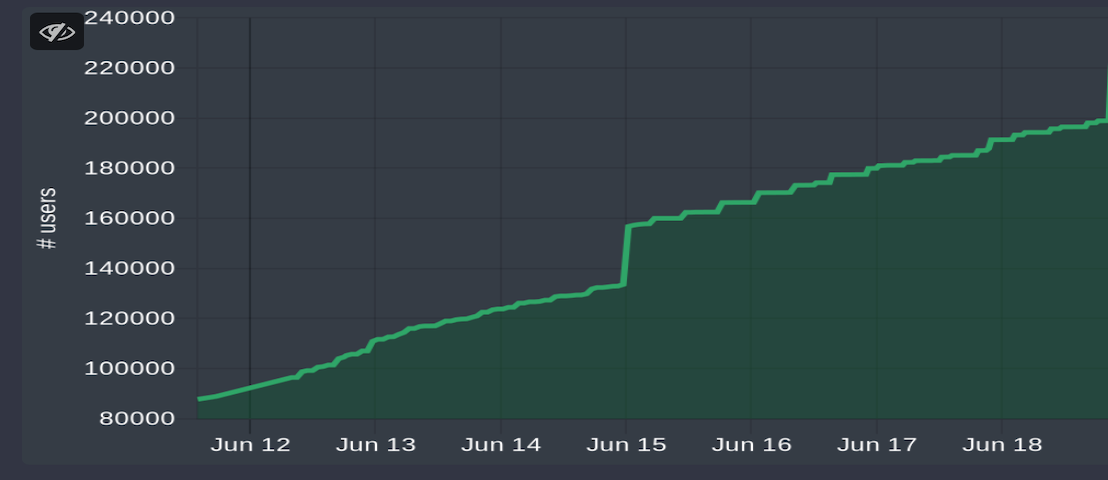Eight days later: Kbin, Lemmy, the landed gentry, and the rise of the "threadiverse" (DRAFT)
Draft! Work in Progress! Feedback welcome!

Update, June 20: After revisions, I integrated this into Don’t tell people “it’s easy”, and six more things Kbin, Lemmy, and the fediverse can learn from Mastodon.
See the discussion n Kbin, Lemmy, and Mastodon – and it's also on Hacker News and Techmeme.

Contents:
- Eight days later ...
- Experiment to find what approaches are a good fit for the current state of the software
- Recruit moderation teams, and put policies and processes in place
- Defederation can be a useful tool
The fediverse has always grown in waves, and it looks like the next one's in progress. The most obvious reddit alternatives in the fediverse are Kbin and Lemmy, both of which offer "link aggregation" functionality: people can post links, memes, videos from around the web, discuss them, and vote on the best posts and comments. They're both quite new, and still relatively small (last week Lemmy had a few thousand active users, and KBin a lot fewer) – but they're open-source projects, so the code can improve quickly, and people or organizations can set up new instances on different websites as new homes for one or more subreddits. Even better, people on one instance can interact with people and communities on other instances – and people already in the fediverse using Mastodon, Friendica, and dozens of other software platforms can interact with Lemmy and Kbin.
How cool is that?
Of course, we're talking about early-stage software here, and today's reality has a lot of confusion, bugs, and limitations along with it's coolness.
– Don’t tell people “it’s easy”, and six more things Kbin, Lemmy, and the fediverse can learn from Mastodon, June 10
Eight days later ...
Tens of thousands of people have signed up for KBin and Lemmy accounts since I first published Don’t tell people “it’s easy”, hundreds of new instances have been created, and "the threadiverse" is suddenly a hot topic of conversation. As expected, many of the newcomers initially found the experience somewhat confusing, especially the federation aspects... but most got the gist of it fairly quickly, and there are plenty of vibrant discussions on multiple topics. As Asif Youssuff's Unofficial Subreddit Migration List and the sub.rehab list illustrate, more and more subreddits are exploring alternatives.
Of course, it hasn't all gone smoothly. The moderation functionality of KBin or Lemmy is waaaaaaay weaker than Reddit – and for that matter, weaker than Mastodon's functionality today. So with limited tools, it's been a real challenge to keep trolling, spam, and porn under control. In that and many other ways, the software's not yet ready for prime time.
But the opportunity's not going away. Reddit CEO Steve Huffman is tripling down, and generally throwing gasoline on the fire. Thousands of moderators are keeping their subreddis private despite the company's following through on their threats to remove volunteer moderators (who Huffman described as "landed gentry")1. Other subreddits are opening up but continuing the protest in creative ways. As Yousuff points out, Reddit's reactions are a clear sign that the protests are working. It's going to be very hard for Reddit to recover trust after the "brutal blackout", so even if they somehow cobble together enough moderators to keep going and people reluctantly stay there for a while, everybody will keep looking for alternatives.
And just as with similar waves to the fediverse in the past, there's also a surge of developers getting involved – contributing bug fixes and new functionality, userscripts to customize the experience, and starting to work on apps. As KBin developer Ernest says,
We have challenging times ahead. We need to cover critical functions in the code, develop better moderation tools, focus on performance, and create user-friendly documentation. By doing so, it will be much easier. And I intentionally use the word "we" because what is happening on Codeberg is absolute madness.
– KBin developer Ernest, in response to fedia.io admin Jerry Bell
Yeah really. As I write this, there are over 40 active "pull requests" (code contributions) in KBin's source code repository on Codeberg; Lemmy has almost 20 pull requests on Github. And I'm sure both code bases will improve significantly. Mastodon's influx in 2016-2017 led to a period of rapid community innovation and similar things are happening in the threadiverse (the suddenly-hot subset of the fediverse including KBin, Lemmy, and other federated threaded-discussion software). That's good!
Looking at the dynamics of the last week, the lessons I highighted in Don’t tell people “it’s easy” all remain very relevant. As I said in that post, though, there's a lot more that can be said. So here's one important lesson I should have included, and a few more thoughts on moderation that fit in well with some of the other lessons.
Experiment to find what approaches are a good fit for the current state of the software
Mastodon instances run the gamut from single-person instances, relatively-small communities, and big general purpose sites. Over time, techniques have been refined for the different approaches – Darius Kazemi's How to run a small social network site for your friends, for example, is an invaluable resource. But unsurprisingly, the software itself is a better match for some approaches than others; mainline Mastodon, for example, has consistently de-emphasized functionality that's very useful for smaller community-focused instances (in contrast to forks like Hometown and Glitch)
KBin and Lemmy are similarly flexible enough that that they're getting deployed in a lot of different ways. For example:
- startrek.website hosts three related communities: Star Trek for news and discussion (and a bit of slash fic), Risa for memes and shitposts, and Daystrom Institute for serious in-depth discussions with no memes or whinging.
- programming.dev and slrpnk.net are also interest-focused, but have dozens of communities
- feddit.it, feddit.nl, midwest.social, aussie.zone, and others have a geographical focus
- beehaw.org is a general-interest site with a lot of communities on differnet topics that's "aspiring to be(e) a safe, friendly and diverse place," with screened signups and active moderation
- lemmy.world and sh.itjust.works are also general-interest but have open registrations and less-active moderation
Some of these approaches are be a better match than others for where the software is today; most obviously, until the moderation tools and scaling improves, larger instances will be a lot more challenging. Of course, with enough creativity and effort, it's often possible to work around the software's limitations and get it to work in less-obvious ways, possibly by making tradeoffs (for example giving up on "good moderation" in the short term in order to keep registrations open).
With relatively-new and fast moving software, there's no substitute for experimentation – and sharing what does and doesn't work.
A few more thoughts on moderation
Recruit moderation teams, and put policies and processes in place
In last week's post I talked about the importance of investing in moderation tools, starting with providing currently-lacking basics, and then over time breaking new ground. But tools by themselves don't solve anything. Moderation is done by people in line with the policies set by instances and specific communities (or magazines). Once the load starts to get heavy, moderation teams also need to put processes in place to make sure that reports from users get responded to, bad actors get warned and then if necessary banned, appeals can be made when needed, and so on.
On Reddit, volunteer subreddit moderators perform the bulk of the moderation – Sarah Gilbert's Towards Intersectional Moderation describes one large, tightly-moderated subreddit. When moderators go absent, don't enforce sitewide policies against harassment or hate speech, or are themselves the source of the problems, with Reddit employees known as "admins" step in. The same two-level approach is likely to apply in the fediverse, although right now many magazines and communities are essentially unmoderated.
The good news is that there are a lot of people in the fediverse who have moderation experience – including some who have helped define policies and processes in subreddits, forums, Facebook groups, chat rooms, or other similar spaces. Anybody running an instance, or a large community or magazine, should be reaching out and looking for help right now. And policies, processes, and practices initially developed for one community can be refined into templates that are potentially more broadly useful.
Defederation can be a useful tool
People who are new to the fediverse often see it as an inherently bad thing when one instances blocks or defederates from another. After all, part of the vision of the fediverse is to have information flowing freely; instance blocking and defederation interfere with that. And when beehaw.org defederated from lemmy.world and sh.itjust.works, it was certainly a hassle for users who have accounts on one of those instances wanted to participate in communities on the other one.
But defederation's also an incredibly valuable tool for limiting the impact of trolls and bigots hosted on loosely-moderated sites. Most Mastodon sites defederate from hundreds of instances, and some have much longer lists. And that's okay!
An important point is that defederation doesn't have to be permanent. When mastodon.social got hit with a wave of spammers that infected the whole fediere, some instances temporarily defederated to limit the annoyance to their users (and load on their admins and moderators) until the problem got under control. As beehaw admins said in their annoncement:
this is also not a permanent judgement (or a moral one on the part of either community’s owner, i should add–we just have differing interests here and that’s fine). in the future as tools develop, cultures settle, attitudes and interest change, and the wave of newcomers settles down, we’ll reassess whether we feel capable of refederating with these communities.
sh.itjust.work's admin TheDude adds
After this happened, the beehaw admins and I had a good chat about their decision. While our stances on registration policies might diverge, we realized that our ultimate goals are aligned: we both strive to foster communities that thrive in an atmosphere of safety and respect, where users can passionately engage in discussions and feel a sense of belonging.
Although the probability of an immediate reversal are slim given the current circumstances, I believe we have managed to identify common ground. It’s evident that, even in separation, we can unite to contribute positively to the broader fediverse community.
Notes
1 I'd love to hear what r/AskHistorians has to say about Steve's description of developers as "landed gentry" but, like many of the 8000+ subreddits that "went dark" in a two-day blackout on June 12-13, they're continuing their protest.
